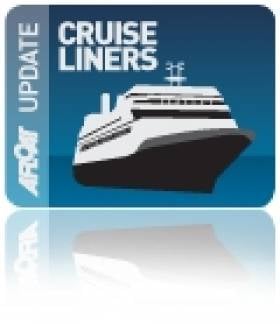Displaying items by tag: Irish ports of call
Loop Head: A Guiding Light for Foynes-Bound Cruise Calls
Her arrival will be followed by P&O Cruises latest addition Adonia on Saturday. With 710 berths the 30,000 tonnes vessel is the smallest of the seven-strong fleet which can accommodate between 1,800 and up to 3,100 passengers as in the case of the Azura. The 115,000 tonnes vessel departed Dublin Port this evening. Her first call to the port was last year (click HERE) and she is the largest cruise ship to call to the capital.
On Tuesday of next week the 9,000 tonnes Spirit of Adventure (cruises) marks the third cruise caller to Foynes. The port is along with five other terminals located throughout the country's largest estuary are operated by the Shannon Foynes Port Company (SFPC).
Incidentally Spirit of Adventure and Azura where two of another trio of cruise ships that visited the Port of Cork on Monday, with Holland America Line's 59,000 tonnes Rotterdam forming the third vessel. This was the first occasion that Cork has handled this number of cruise ships on a single day, bringing 7,000 passengers which set a new record for the port.
- Shannon Estuary
- Shannon Foynes Port Company
- P&O Cruises
- Loop Head
- Cruiseships
- lighthouses
- Dublin Port news
- Holland America Line
- Port of Cork News
- Le Diamant
- Cruiseliners
- Spirit of Adventure
- Shannon Estuary news
- Loop Head Lighthouse visitor centre
- Azura cruise ship
- Spirit of Adventure cruiseship
- Adonia cruiseship
- Rotterdam cruiseship
- Loop Head Lighthouse
- Shannon Estuary and River
- Shannon Estuary and River news
- Lighthouse news
- Irish cruise calls
- Irish ports of call
- Foynes Port
























































